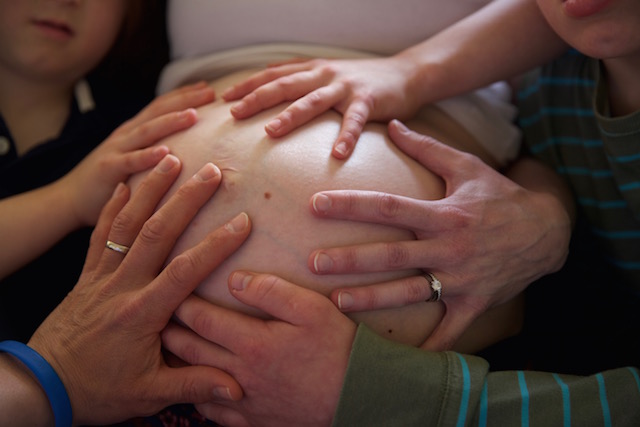
I’ve never shared this publicly because I was too ashamed to talk about it for a long time.
Only the people close to me know about it.
However, after hearing about one mom who developed a postpartum psychosis, and about another one with a postpartum depression—I need to speak out.
After my third child was born, I experienced some form of postpartum depression. It was never diagnosed, but I didn’t know how to make it to the next minute let alone the next day. I had suicidal thoughts but felt too stuck to act on them—I could not abandon my kids. I felt helpless. It led to five years of alcohol and sleeping pills to quell my fear of sleep.
There seems to be an idea out there that having babies is easy. It is not. There is a reason for the saying: “It takes a village to raise a child.”
Having a baby is incredible—from ecstasy to despair, but the ecstasy side of the spectrum (the good stuff) only happens if you have the support you need to experience it, and I do not believe our culture as a whole supports new moms.
We seem to be particularly “villageless,” us and our nuclear families. Moms with new babies are expected to go back to work, to get back in shape, to cook, to have a clean and tidy house, to look after their other children, to get back to their previous life, basically to get back to doing it all (by themselves), within days or weeks of having a baby.
The expectations and pressures are completely unrealistic. Add this to our tendency to push away and hide uncomfortable feelings on social media, which makes it seem like everyone else has it together and we’re the only ones failing. (Five minutes before we posted that cute baby photo on Facebook and Instagram, we were sobbing on the floor. Really.) And it’s a recipe for disaster.
No one took me seriously, or at least not seriously enough. I’m not sure if the people who knew what was going on knew what to do, or how to help, or that it was as serious as it was? In my mind, I felt (and still feel) like people thought, “This is what having babies is like. Yes, it’s hard, but it will end and everyone does it and you just have to get through it and suck it up.”
It’s been like this for other women I know too (and I didn’t want to just have to “get through it.” I wanted this baby, I want to love having a baby!) They had to be hospitalized or do something drastic (like disappear) to get heard.
The thing was, I couldn’t suck it up or work harder. I had been pushed under the water and was drowning. I needed someone to pull me up and there was no one there. Which is where the drugs and alcohol came in. Thankfully, I found a regular yoga and meditation practice, which helped me to quit the drugs and alcohol.
With my fourth child, I got prepared. I knew my limits, I knew what I was scared of, and I set myself up with the tools and supports I needed to help me.
I also let go of cultural ideas about how quickly I needed to “get back at it” after having a baby and I let go of the “super mom” ideal that I should be able to do it all, by myself.
Without external pressures, I didn’t have to worry about getting back to my “pre-pregnancy shape” (Insert here a barf emoticon. I birthed a freaking human, my body will never be the same!) or somehow watch one child at gymnastics for five hours because she is having a hard time adjusting to the new sibling in the house, while making dinner, while picking up two other kids from school, while breastfeeding, while doing the laundry—you get the idea.
My hope in writing this blog is that our awareness surrounding the postnatal period and our support of new moms and new babies will grow so that as a culture, we can recognize and respect how life altering having a baby is (even if it’s your fourth.)
I am writing this is for all mothers. For all mothers who have gone through some form of postpartum depression or psychosis in silence and isolation.
For all mothers who are still tackling fear as a result of postpartum depression or psychosis. For all mothers to be and for all babies to come.
Find or build your village and lean on them for support. Ask them questions. Ask for help.
Call them to sob and to celebrate! If you are or wind up in complete darkness, know there is light at the end of the tunnel.
I couldn’t see it with my third child—I was completely surrounded and saw no way out—but now that I have come through it, I know it is there.
I am also writing this for all families and communities bringing babies into their fold. Moms need you.
Probably more than they will say. Having a baby is not easy, but it will be incredible and it can be amazing if you have or get the support you need.
If you think you’re alone, you’re not. You are not crazy and you are not a horrible mother. You are one of us.
Author: Deb Purcell
Image: Author’s Own
Editor: Sara Kärpänen








Read 1 comment and reply